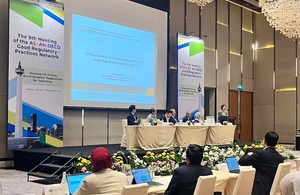The 9th ASEAN-OECD Good Regulatory Practice Network promotes better regulatory frameworks
This year’s GRPN meeting focuses on building better regulation to address modern-day challenges.

The 9th ASEAN-OECD Good Regulatory Practice Network (GRPN) took place in Jakarta, Indonesia, hosted by the Coordinating Ministry for Economic Affairs, co-organised with the Organisation for Economic Co-Operation and Development (OECD) and supported by the United Kingdom. This annual forum plays an important role as a platform for discussing and sharing insights on implementing Good Regulatory Practices across ASEAN and its partner countries, while also strengthening the OECD’s engagement with ASEAN on regulatory reform.
With rapid technological advancements, ASEAN faces complex cross-border social, economic, and environmental issues, making well-designed regulations more critical than ever.
The discussion drew upon the frameworks of the OECD and ASEAN, including the OECD Recommendation of the Council on Agile Regulatory Governance, the OECD Recommendation of the Council on Artificial Intelligence, OECD’s Better Regulation in the Digital Age (BRIDGE), The ASEAN Digital Masterplan 2025, the Bandar Seri Begawan Roadmap, the forthcoming ASEAN Digital Economy Framework Agreement (DEFA), as well as the ASEAN Economic Community Blueprint 2025.
The GRPN meeting on 28 November consisted of four plenary sessions focusing on key themes: Navigating Digital Challenges and Opportunities in ASEAN; Leveraging Tools to Support GRP for Advancing Economic Integration; Advancing Agile Regulatory Governance for the Future; and Taking Stock of GRP Initiatives around Southeast Asia. It was a huge success with more than 100 participants from ASEAN Member States (AMS) and Timor-Leste, as well as ASEAN partners such as United Kingdom, New Zealand, India, Republic of Korea, and Saudi Arabia.
In his opening remarks, Edi Prio Pambudi, Deputy Minister for International Economic Cooperation, Coordinating Ministry for Economic Affairs of the Republic of Indonesia, welcomed all speakers and participants to the event. He emphasized the importance of the cooperation between ASEAN and OECD as outlined in the 2022 Memorandum of Understanding.
He highlighted the OECD’s contribution to the development of “The ASEAN Handbook on Good Regulatory Practice” in 2022, a key deliverable under the ASEAN Economic Community (AEC) Blueprint 2025 in area of GRP. He further underscored the ASEAN-OECD GRPN’s importance in connecting ASEAN Member States and supporting their efforts in implementing GRP. Edi Pambudi also emphasized Indonesia’s commitment to advance regulatory reform, especially in light of Indonesia’s ongoing accession process to the OECD. Edi Pambudi further expressed confidence that synergized and collaborative initiatives from the OECD and ASEAN in regulatory reform will benefit the agendas of AMS, including Indonesia’s accession to the OECD. He thanked the UK for its support for the event and going collaboration in the network.
Daniel Trnka, Deputy Head of the Regulatory Policy Division, OECD’s Public Governance, said:
In today’s rapidly evolving world, governments face significant policy challenges in managing the green and digital transitions. Effective regulations are vital – they create the enabling environment for innovation to thrive, while protecting the wellbeing of citizens and businesses and building public trust in our government institutions.
Now in its 9th year, the ASEAN-OECD Good Regulatory Practices Network has proven invaluable as a forum for sharing of practical solutions between ASEAN and OECD communities to help shape better regulation for our modern society. I want to acknowledge the outstanding leadership from our co-chairs, Malaysia and New Zealand, while thanking our hosts Indonesia for their excellent organisation and the United Kingdom for their continued support.
Benjamin Matthews, Chargé d’Affaires of the UK Mission to ASEAN, also said:
The UK is committed to knowledge-sharing partnerships, technical assistance and capacity- building to support economic integration in ASEAN and with Timor Leste. Regulatory reform, financial services and open trade are the three pillars of our ASEAN-UK Economic Integration Programme (EIP) which was launched earlier this year.
We are always looking to find ways to improve regulatory approaches, particularly in response to digitalisation as a key driver of economic growth, which will shape the future of all our countries. So, we are delighted to support this important meeting, which combines the two agendas. We look forward to working with the Network in the years ahead.